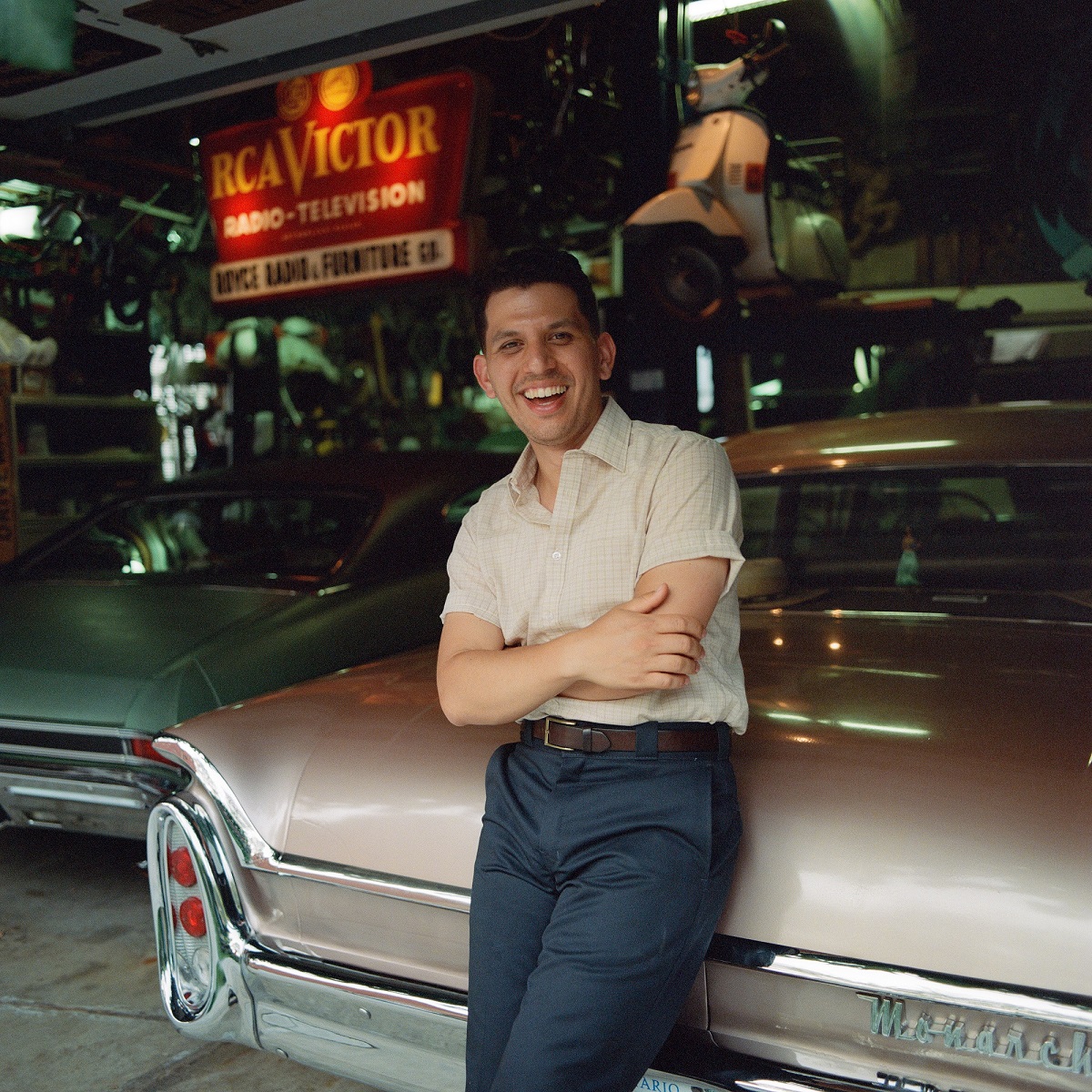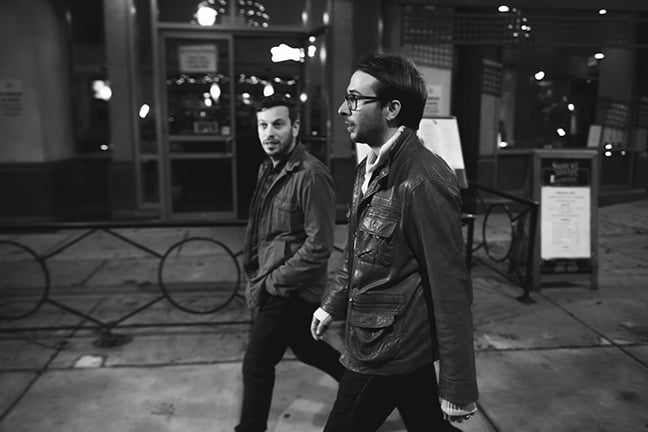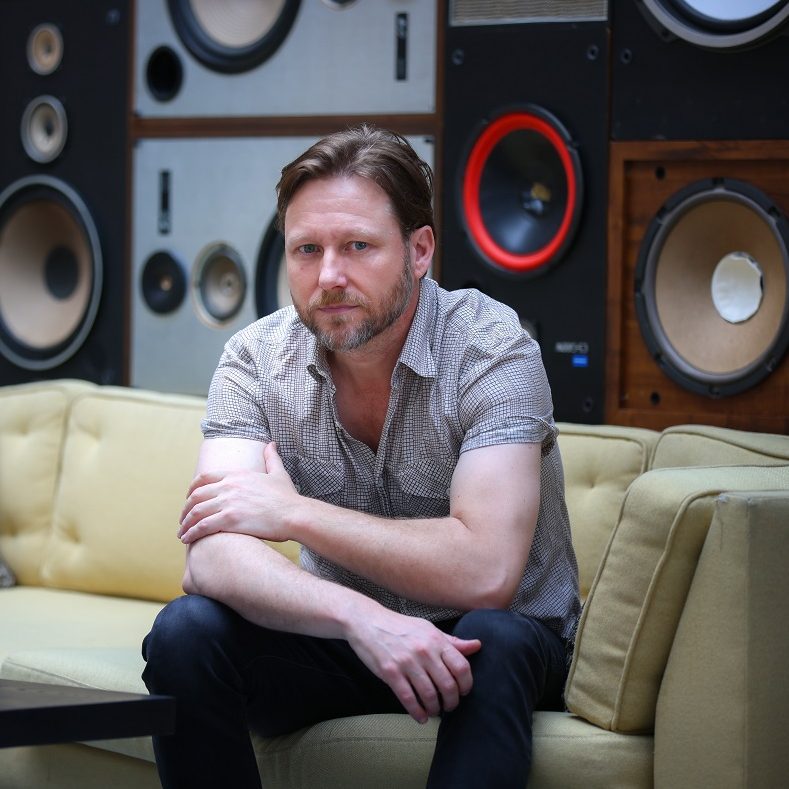From the Bluegrass Situation and WMOT Roots Radio, it’s Hangin’ & Sangin’ with your host, BGS editor Kelly McCartney. Every week Hangin’ & Sangin’ offers up casual conversation and acoustic performances by some of your favorite roots artists. From bluegrass to folk, country, blues, and Americana, we stand at the intersection of modern roots music and old time traditions bringing you roots culture — redefined.
With me today in the Writers’ Rooms at the Hutton … Béla Fleck and Abigail Washburn. Welcome, you guys!
Both: Hi!
Echo in the Valley, the latest duo release. It’s your second. The first one, it did okay for you. You know, you got a Grammy, whatever. My real question, what’s the body count on this record?
Abigail Washburn: How many people have died in the making of the record?
No, on the record, how many people died? Because the last one had a body count.
Béla Fleck: That’s true, and we’ve moved away from that sort of thing on the new record. And we’re talking about the murder ballads, of course! [Laughs] For anybody out there who’s really getting uncomfortable. Yeah, we didn’t go so much into the murder ballads. Though, to tell you the truth, the one song that Abby wrote, “Shotgun Blues,” it sounds terrible, but nobody actually gets hurt in it. It’s actually a very sweet situation.
I’m not sure I believe that.
BF: It’s all about a girl who’s giving a guy a good talkin’ to.
AW: At the end of a shotgun.
BF: At the end of a shotgun, but no actual creeps get knocked off in the song. But we decided to stop doing it presently anyway, just because of the current horrible things that have been happening in our country, and just to give that stuff a bit of a rest.
AW: Because it was really supposed to be kind of humorous in a way, you know.
BF: Yeah, it was a joke.
AW: I mean it was a serious response to the fact that it’s usually women who die in murder ballads. So it had a serious intention, which was to expose that and take the power back in a funny way. But right now it doesn’t feel like shotguns are funny.
That’s true.
AW: So we had trouble continuing to play that song. Which is good, anyway, because there’s all this other material on this record that we’re eager to share with you.
BF: I was thinking we could rewrite the song a bit and make it be about a slingshot, about a girl holding a slingshot on this creep and just stay there until he gets his crap together, and if he doesn’t, oh boy, he’s gonna get zonked, right in the left eyeball.
AW: That’s creative honey. We’ll work on that.
…
I’m a big fan of Krista Tippett’s and On Being, and your episode is one of my very favorites.
BF: Thank you.
The way you guys think and talk about the banjo and the history of the banjo and what that means to you, and how you carry that forward and hold that in your music — its power, its potential, all of those things — it’s just remarkable to me. It was very moving to hear you talk about it. If you had to sum up what the banjo means to you in a few words, what would it be?
BF: Well, I’ll start and you just think about something better to say than what I’m gonna say.
AW: I usually do. [Laughs]
BF: Yes, she actually does. But for me, I just love the banjo, so of course, if you love something, you look for all of the cool things about it and the things that you identify with. It’s kind of justifying a life of pursuing something you really dig. And because you spend so much time around it, you learn those things that really make it special. So I know that there are a lot of other wonderful things in the world besides the banjo, but for me, making the banjo the most important thing in my life, until I met Abby and until we had kids, and that changed the balance …
Only just a little, though. [Laughs]
BF: Yeah, it goes back and forth. But then you learn the story of the banjo, and it becomes a very noble story. You can see the history of mankind through this instrument. It’s just powerful. There are so many stories in this thing — from African roots, and even before Africa, probably in Mesopotamia, and then coming here and being this hybrid instrument that crosses between Black and white society and, eventually, crosses over completely to white society, to the point where Black folks, a lot of folks don’t even really realize the banjo came from their heritage anymore. It’s kind of confusing. So I don’t know, I love history anyway. I’m a history buff. I love reading history books, and I read a lot of books about American history, and then I ended up sort of in the middle of it falling in love with this instrument. Now it’s time for Abby to say something much better.
AW: [Laughs]
Whatcha got, Washburn?
BF: Lay it on us!
AW: I completely agree with Béla, as to all the aspects of how it’s intellectually enlightening to learn through the banjo — its history and its path and its journey through the world, and especially in American society. For me, a lot of music is very much about spirit and spirituality, and what I mean by that is, there’s a spirit that can be channeled and passed along when something like this, an object that does have so much history to it, when I pick it up and start playing it, and I can feel the stories of people before. I know Béla and I both feel that these stories people have been singing about from the past are so important because they expose how humans have been and the patterns of human behavior throughout history — their hopes, their wants, the trials and tribulations they lived through, the joys and the successes of life. It’s just so helpful to hear those old stories and recognize that humans are still basically the same. There’s comfort in that, but there’s also a calling.
And so the spirit of the banjo, its heritage, and the voices that come to me through it teach me that there’s a lot to retain and preserve from our history and our roots, but there’s also a lot to be thought about, in terms of the potential of humans to transform and change. And there are ways we really need to do that. There are mistakes and sufferings we impose on each other that the old stories tell us about — like old murder ballads is a very obvious one. Protest songs, inspirational songs … like we do a version of a song called “Come All Ye Coal Miners,” which is a woman named Sarah Ogan Gunning in Appalachia telling the people, “I’ve lost two children to starvation, both my husband and my father died of black lung. This is wrong.” And yet, this is still happening today. So we can sing the same song that was written by her 60 years ago in the mining camps, and it’s still very powerful today, and it can be a catalyst for change. So I believe music is a catalyst for change and for preservation, and all of it’s important.
BF: And also just reminding us of things. Because we make the same mistakes over and over again, as people and as a race. So if you’re cognizant of things that have happened before, you might have a better chance of avoiding some of them.
I just want to throw one weird thing out there: It just sort of struck me that the banjo was rejected by Black people because it too much embodied the slavery days. And then later, it was rejected by white people because it too much embodied white Southern culture for a lot of people, and it was put down and made a joke of. So it’s been made a joke of from both angles. It’s very ironic. And then you’ve got people from all over the world … I mean, I come from New York City, what am I doing playing the banjo? But you know, there is a lot of banjo playing from the 1800s on in New York City. So anyway, that’s my last thing to throw in on that subject.
AW: I’m just gonna dovetail on what you’re saying. It feels like a powerful time right now. There’s a lot of polarity, lots of energy going in different directions, divisiveness, people sensationalizing emotion into reality. So it feels like a time when there can be a very transformative impact from things in culture, like music. And it does feel like a new day for the banjo. And that’s global, but also very connected to roots and to our local existence, too. And I think it’s the perfect device to channel what we need, which is preservation of what’s beautiful, what’s meaningful, what defines us, and the power to change what happens in the future.
Watch all the episodes on YouTube, or download and subscribe to the Hangin’ & Sangin’ podcast and other BGS programs every week via iTunes, Spotify, Podbean, or your favorite podcast platform.






